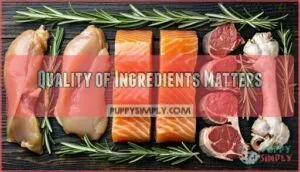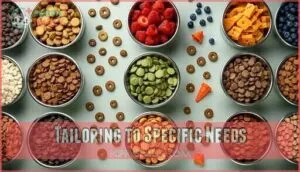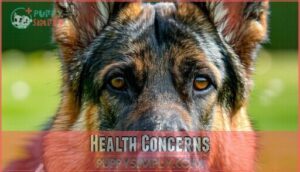This site is supported by our readers. We may earn a commission, at no cost to you, if you purchase through links.

These athletic dogs burn through energy like there’s no tomorrow, so they need easily digestible ingredients and probiotics to keep their sensitive stomachs happy.
Look for large breed formulas that won’t break the bank but still deliver the goods, as your GSD isn’t just any dog—they’re basically four-legged athletes who deserve fuel that matches their drive.
The right choice can prevent common issues down the road.
Table Of Contents
- Key Takeaways
- German Shepherd Nutrition
- Choosing Best Dog Food
- Top 10 Best Foods
- 1. Dr Gary Best Breed German Dry Dog Food
- 2. Real Chicken Sweet Potato Dog Food
- 3. Blue Buffalo Wilderness Salmon Dog
- 4. Holistic Select Large Giant Breed Adult Dog Food
- 5. Diamond Naturals Large Breed Dog Food
- 6. Eagle Pack Power Adult Dog Food
- 7. Victor Nutra Pro Dog Food
- 8. Iams Adult Large Breed Chicken Dry Dog Food
- 9. Taste Wild Southwest Canyon Dog Food
- 10. Orijen Puppy Large Puppy Food
- Feeding German Shepherds
- Health Concerns
- Dietary Solutions
- Frequently Asked Questions (FAQs)
- What dog food brand is best for German Shepherds?
- What is the best food to give a German Shepherd dog?
- Is wet or dry food better for German Shepherds?
- Can German Shepherds eat raw food diets?
- What human foods are toxic to shepherds?
- How often should puppies eat daily?
- Do German Shepherds need grain-free diets?
- When should I switch to senior food?
- Conclusion
Key Takeaways
- Choose high-protein formulas (22-25%) with quality sources like chicken or salmon as the first ingredient to support your GSD’s athletic build and muscle development.
- Look for joint-supporting ingredients including glucosamine and chondroitin to prevent hip and elbow dysplasia, which affects nearly 20% of German Shepherds.
- Select foods with probiotics and easily digestible ingredients to manage your dog’s sensitive stomach and prevent common digestive issues like bloating.
- Feed 2-3 meals daily on a consistent schedule with portions based on your dog’s weight and activity level to reduce bloat risk and maintain optimal energy.
German Shepherd Nutrition
Your German Shepherd’s nutritional needs go far beyond basic kibble, requiring specific protein levels, joint support, and digestive care to maintain their athletic build and prevent common health issues.
Understanding these unique requirements helps you choose food that supports their muscle development, protects their joints from dysplasia, and keeps their sensitive digestive system running smoothly, which is crucial for their overall health and to prevent issues like joint dysplasia and support digestive care.
High Protein Content for Muscle Health
Your German Shepherd’s athletic build demands high-quality protein sources like chicken, beef, or fish to fuel muscle development and maintenance.
These working dogs require 22-24% protein content for ideal energy levels and efficient protein digestion.
Quality dog food with real meat as the first ingredient supports your breed’s specific muscular needs better than grain-heavy alternatives, providing high-quality protein for muscle development.
Joint Health Support With Glucosamine and Chondroitin
Your German Shepherd’s joints need extra support due to their breed predisposition to hip and elbow dysplasia.
Look for dog food for joint health containing glucosamine and chondroitin as preventative measures.
These compounds offer long-term effects by maintaining cartilage health and reducing inflammation.
Proper supplement dosage through quality nutrition beats expensive alternative therapies later.
Digestive Health Through Probiotics and Easily Digestible Ingredients
Your German Shepherd’s gut microbiome thrives with the right digestive support, making probiotics and easily digestible ingredients essential for peak health.
Dogs with sensitive stomachs or food intolerances benefit from enzyme supplementation and high-quality fiber sources that promote beneficial bacteria growth.
Choosing German Shepherd food designed for digestive health helps prevent common issues like bloating and guarantees your dog’s system processes nutrients efficiently for better overall wellness.
Choosing Best Dog Food
When choosing the best food for your German Shepherd, you’ll need to prioritize high-quality protein sources, joint-supporting ingredients, and formulations that match your dog’s specific life stage and health needs.
Smart selection involves reading ingredient labels carefully, consulting your veterinarian about breed-specific requirements, and considering factors like your dog’s activity level, age, and any existing health conditions, which all contribute to making a smart selection.
Quality of Ingredients Matters
When you’re scanning dog food ingredients, you’re basically reading your German Shepherd’s health blueprint.
High-quality protein sources like deboned chicken, salmon, or lamb should top the list, not generic meat meals.
Limited fillers such as corn and wheat mean more nutrients per bite.
Natural ingredients without artificial colors or preservatives support better digestion.
Reading labels helps you avoid common allergens that trigger skin issues in German Shepherds, which is a crucial step in maintaining your dog’s overall health.
Tailoring to Specific Needs
Instead of choosing generic large breed food, you’ll want to match your German Shepherd’s specific requirements for ideal health and performance.
Consider these key factors when selecting breed-specific diet options:
- Life Stage – Puppies need higher protein (22-24%) while seniors require joint support supplements
- Activity Level – Working dogs need increased calories and protein-to-fat ratios for sustained energy
- Health Conditions – Hip dysplasia requires glucosamine, while allergies need limited-ingredient formulas
- Weight Management – Monitor portions based on body condition to prevent obesity-related joint stress
- Breed Predispositions – German Shepherds benefit from bloat-preventing smaller meals and digestive enzymes
Research and Consultation
Before choosing any dog food, you’ll want to dig deeper than flashy marketing claims.
Expert veterinarians and breed-specific studies provide the foundation for smart decisions, while ingredient analysis helps you decode complex labels.
Following established nutritional guidelines isn’t optional—it’s essential for your German Shepherd’s health.
Consult breeders, read dog food reviews, and consider online vet consultation for personalized guidance.
Many owners prioritize brands that meet AAFCO standards for nutritional adequacy.
Top 10 Best Foods
Choosing the right food for your German Shepherd doesn’t have to feel overwhelming when you know what to look for in quality nutrition.
These ten vet-approved options provide the high protein content, joint support, and digestive health your GSD needs to thrive throughout their active life.
1. Dr Gary Best Breed German Dry Dog Food
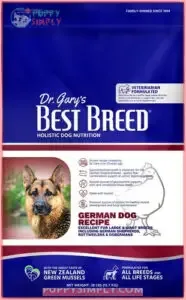
Dr Garys Best Breed German Dry Dog Food targets your German Shepherd’s specific needs with breed-focused nutrition.
This german shepherd food features a guaranteed analysis showing 26% protein and 16% fat, supporting muscle development.
Ingredient analysis reveals real chicken as the first component, plus glucosamine for joint health.
Cost comparison shows competitive pricing for breed-specific diet formulations, while palatability studies indicate strong acceptance rates among German Shepherds.
2. Real Chicken Sweet Potato Dog Food
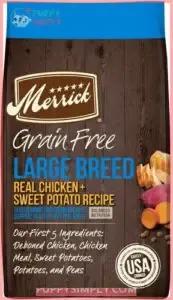
This chicken protein and sweet potato recipe delivers complete nutrition formulated for German Shepherds’ specific dietary needs.
Sweet potatoes provide complex carbohydrates and fiber for sustained energy, while real chicken supports muscle development.
Key ingredient benefits include:
- High-quality chicken protein for lean muscle mass
- Sweet potatoes offering beta-carotene and digestive support
- Balanced recipe analysis shows ideal protein-to-carb ratios for a balanced recipe.
3. Blue Buffalo Wilderness Salmon Dog

Blue Buffalo Wilderness Salmon Dog Food delivers high-quality salmon protein that’s perfect for German Shepherds with chicken sensitivities.
This grain-free formula supports healthy skin and coat while reducing allergy flare-ups.
You’ll appreciate how the breed-specific nutrition profile matches your shepherd’s active lifestyle, providing essential amino acids for muscle maintenance and omega fatty acids for superior coat health.
4. Holistic Select Large Giant Breed Adult Dog Food

Holistic Select consistently delivers complete nutrition specifically formulated for your German Shepherd’s large breed requirements.
This dog food undergoes rigorous Ingredient Analysis, featuring deboned chicken as the primary protein source alongside digestive enzymes that enhance Digestibility Factors for ideal nutrient absorption.
Key breed-specific features include:
- Glucosamine and chondroitin for joint health maintenance
- Prebiotics and probiotics supporting digestive wellness
- Omega fatty acids promoting healthy skin and coat
- Controlled calcium levels preventing developmental issues
The Palatability Review shows excellent acceptance rates among German Shepherds, while Cost Comparison reveals competitive pricing for premium large breed formulations.
5. Diamond Naturals Large Breed Dog Food
Diamond Naturals delivers solid nutrition for German Shepherds without breaking the bank.
This large breed formula packs real chicken as the first ingredient, plus glucosamine for joint health support.
Customer reviews consistently praise its digestibility and value proposition for breed-specific needs.
AAFCO approval guarantees nutritional adequacy.
| Feature | Diamond Naturals | Comparison Notes |
|---|---|---|
| Protein Content | 23% | Meets large breed requirements |
| Glucosamine/Chondroitin | 750/250 mg/kg | Supports German Shepherd joint health |
| Price per Pound | $1.20-1.50 | Budget-friendly option |
| Primary Protein | Chicken meal | High-quality, concentrated source |
| Feeding Trials | AAFCO approved | Scientifically validated nutrition |
Ingredient analysis reveals quality protein sources with minimal fillers.
The cost comparison shows excellent value for large breed formulations, making it accessible for German Shepherd owners on tighter budgets while maintaining nutritional standards.
6. Eagle Pack Power Adult Dog Food
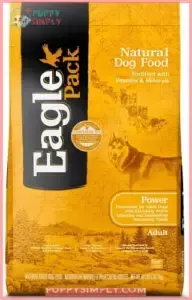
High-performance canines demand nutrition that matches their energy.
Eagle Pack Power Adult Dog Food delivers exceptional protein sources through chicken meal and fish meal, ensuring ideal digestibility factors for your German Shepherd’s active lifestyle.
This large breed formula features ingredient analysis showing 30% protein content, supporting muscle development.
The palatability review confirms dogs love the taste, while cost comparison reveals reasonable pricing for premium breed-specific diet nutrition.
7. Victor Nutra Pro Dog Food
Victor Nutra Pro delivers exceptional nutrition for German Shepherds with its high protein food formula featuring real chicken as the primary protein source.
This breed-specific diet contains 38% protein, perfect for active dogs requiring sustained energy.
Ingredient analysis reveals glucosamine and probiotics supporting joint and digestive health.
Palatability factors make mealtime enjoyable, while cost comparison shows excellent value for premium nutrition your shepherd deserves.
8. Iams Adult Large Breed Chicken Dry Dog Food
Affordability meets nutrition when you’re feeding a German Shepherd on a budget. Iams Adult Large Breed Chicken Dry Dog Food delivers solid protein source quality with real chicken as the primary ingredient, though palatability concerns arise with some picky eaters.
- Ingredient Analysis reveals glucosamine and chondroitin for joint support
- Digestibility Factors include prebiotics for sensitive stomachs
- Cost Comparison shows excellent value for large breed nutrition
- Breed-specific diet features customized kibble size for German Shepherds
- Proven track record supports healthy muscle development
9. Taste Wild Southwest Canyon Dog Food

Wild game meets modern nutrition in Taste of the Wild Southwest Canyon.
This grain-free formula features wild boar as its primary protein source, delivering 32% crude protein perfect for German Shepherds.
The ingredient analysis reveals sweet potatoes and peas providing digestible carbohydrates, while probiotics support gut health.
Though breed suitability is excellent for active dogs, allergy concerns exist with novel proteins.
The cost comparison positions this high-protein dog food as premium-priced but worthwhile for dogs thriving on breed-specific diets.
10. Orijen Puppy Large Puppy Food
For German Shepherd puppies destined for greatness, Orijen Puppy Large delivers premium nutrition that’s practically breed-specific diet perfection.
This Canadian-crafted puppy food targets large breed development with controlled calcium levels, preventing rapid growth issues common in German Shepherds.
- 38% protein from fresh regional ingredients supports healthy puppy development
- Limited carbohydrates (20%) mirror ancestral feeding guidelines for ideal growth
- Ingredient analysis reveals 85% quality animal ingredients, 15% vegetables and fruits
- Cost comparison shows higher price point justified by superior nutritional density
The use of fresh regional ingredients and careful formulation makes this food an excellent choice for German Shepherd puppies, providing them with the necessary nutrients for optimal growth and development.
Feeding German Shepherds
You’ll need to carefully calculate your German Shepherd’s food portions based on their age, weight, and activity level since these powerful dogs require precise nutrition to maintain their athletic build.
Getting the feeding schedule right prevents bloat and digestive issues while ensuring your shepherd gets the energy they need for their active lifestyle.
How Much Food Should My German Shepherd Eat
Looking at your German Shepherd’s size and activity level will guide proper portions.
Adult German Shepherds typically need 2.5-3.5 cups of quality dog food daily, while puppies require about 35-40 calories per pound of body weight.
It’s important that large breed puppies consume specialized food for healthy bone development.
Weight monitoring guarantees you’re meeting their nutritional needs without overfeeding.
| Life Stage | Daily Amount |
|---|---|
| Puppy (8-12 weeks) | 1.5-2 cups |
| Adult (50-90 lbs) | 2.75-5.25 cups |
| Senior | 1,300-1,600 calories |
Feeding Schedule and Frequency
Establishing consistent meal timing helps your German Shepherd’s digestive system function ideally. Adult dogs thrive on two meals daily, spaced 8-12 hours apart.
Puppy feeding requires three to four smaller portions throughout the day to support rapid growth. Senior dogs often benefit from smaller, more frequent meals to aid digestion.
Consider using a consistent feeding schedule for optimal results. This structured approach substantially reduces bloat risk while accommodating varying activity levels, leading to a healthier digestive system with optimal results and a reduced need for frequent meals.
Monitoring Food Intake and Adjusting as Necessary
Your German Shepherd’s portion size needs regular fine-tuning based on weight changes and activity levels.
Track calories against your dog’s current body condition, adjusting servings when you notice weight fluctuations.
Monitor stool consistency as a health indicator—firm stools signal proper digestion of their breed-specific diet.
Active dogs need more fuel than couch potatoes, and it’s essential to adjust their diet accordingly to maintain optimal health, considering their breed-specific needs.
Health Concerns
German Shepherds face several breed-specific health challenges that require careful dietary management to prevent complications.
Hip dysplasia, digestive sensitivities, and skin problems can all be addressed through proper nutrition choices that target these vulnerable areas, which is crucial for their health and wellbeing, and proper nutrition can make a significant difference.
Hip Dysplasia and Joint Health
Several factors make German Shepherds particularly vulnerable to hip dysplasia, a genetic predisposition affecting nearly 20% of the breed.
Weight management proves essential since excess pounds stress developing joints. Your dog’s exercise impact matters too – controlled activity builds muscle support while overexertion damages growing cartilage.
Supplement timing with glucosamine and chondroitin works best when started early. Early detection through proper breed-specific diet and large breed formulas helps prevent severe joint deterioration, which is crucial for weight management.
Digestive Issues and Food Allergies
Beyond joint health, digestive issues plague many German Shepherds due to their sensitive stomachs.
Common allergens like beef, chicken, and grains trigger reactions including vomiting and diarrhea.
Limited ingredients diets featuring novel proteins help identify triggers while supporting the gut microbiome.
Enzyme supplementation aids digestion, making breed-specific diets particularly beneficial for managing food allergies effectively.
A balanced diet is key to maintaining gut stability, which is crucial for overall health, and managing food allergies is essential for German Shepherds with digestive issues.
Skin and Coat Health
Your German Shepherd’s beautiful double coat reflects their overall health, but skin problems can quickly turn that lustrous fur dull.
Omega fatty acids, particularly omega-3s, work like internal moisturizers to combat dry, flaky skin while promoting coat quality. Vitamin E benefits include protecting skin cells from damage, while mineral deficiencies often manifest as brittle fur.
Common allergy triggers in dog food—beef, chicken, wheat—frequently cause itchy skin and hot spots in German Shepherds. Supplementing their diet with chia seeds can further help reduce inflammation and promote a healthy coat, which is essential for their overall health and skin cells.
Dietary Solutions
You’ll want to focus on three key dietary components that directly address your German Shepherd’s most common health challenges.
Balanced carbohydrates provide sustained energy for their active lifestyle.
Essential vitamins and minerals support bone development and immune function, while omega-3 fatty acids keep their thick double coat shiny and reduce inflammation in joints.
Balanced Carbohydrates for Energy
Beyond just protein and fat, your German Shepherd needs the right carb sources to fuel their active lifestyle.
Quality whole grains and vegetables provide steady energy levels while supporting digestibility. Nutrient-rich whole grains also aid in digestive processes.
- Sweet potatoes and brown rice – offer complex carbs with excellent fiber content
- Avoiding fillers like corn syrup keeps energy stable throughout the day
- Digestible vegetables support gut health without causing digestive upset
Essential Vitamins and Minerals for Overall Health
When choosing dog food for your German Shepherds, you’ll need key vitamins and minerals that work like a well-oiled machine.
Calcium and phosphorus support bone health, while zinc aids nerve function and digestion.
B-vitamins boost immune support, and vitamin K guarantees proper blood clotting.
These nutrients create the foundation for your breed-specific diet, addressing your German Shepherd’s unique nutritional needs through quality canine nutrition.
Omega-3 Fatty Acids for Skin and Coat Health
Omega-3 Sources from marine fish like salmon and sardines deliver superior EPA and DHA compared to plant alternatives.
Your German Shepherd’s coat health depends on proper dosing—typically 20-55mg per pound of body weight daily.
- Coat Benefits: Enhanced shine and reduced shedding within weeks
- Skin Inflammation: Anti-inflammatory properties reduce itching and hot spots
- Supplement Options: Fish oil capsules or liquid forms work effectively
- Dosage Guidelines: Start with lower amounts, gradually increasing as needed
- German Shepherds: Require consistent omega fatty acids for ideal skin health
Frequently Asked Questions (FAQs)
What dog food brand is best for German Shepherds?
No single brand reigns supreme for German Shepherds.
You’ll want high-protein options like Royal Canin, Hill’s Science Diet, or Orijen that support joint health with glucosamine and offer easily digestible ingredients.
What is the best food to give a German Shepherd dog?
You’ll want high-protein kibble with real meat as the first ingredient, plus omega-3s for joint health.
Look for brands containing glucosamine and chondroitin to support their hips and elbows throughout life.
Is wet or dry food better for German Shepherds?
Picture your German Shepherd’s bowl as a crossroads between convenience and nutrition.
Both wet and dry foods work well, but dry kibble typically wins for dental health, cost-effectiveness, and easier storage.
While wet food offers better hydration and palatability for picky eaters.
Can German Shepherds eat raw food diets?
Yes, German Shepherds can eat raw diets, but you’ll need careful planning to avoid nutritional imbalances and bacterial contamination. Consult your vet first, especially given their joint health needs.
What human foods are toxic to shepherds?
Like a minefield for your furry friend, many common kitchen staples spell danger.
Chocolate, grapes, onions, garlic, xylitol, avocado, and alcohol top the toxic list, causing severe poisoning or death in shepherds.
How often should puppies eat daily?
German Shepherd puppies should eat 4-6 times daily until 12 weeks old, then gradually reduce to 3-4 meals. Frequent feeding supports their rapid growth and prevents digestive issues.
Do German Shepherds need grain-free diets?
Studies show 85% of grain-free diets for dogs aren’t necessary unless there’s a specific allergy.
You don’t need grain-free food for your German Shepherd unless they’ve been diagnosed with grain allergies, which are quite rare.
When should I switch to senior food?
Switch your German Shepherd to senior food around age 7- Their metabolism slows down, requiring fewer calories and added joint supplements like glucosamine to support aging bones.
Conclusion
Choosing the best dog food for German shepherds means prioritizing protein content, supporting joint health, and maintaining digestive wellness.
Quality ingredients matter more than marketing claims, while breed-specific formulations address your GSD’s unique athletic demands.
Research thoroughly, consult your veterinarian, and monitor your dog’s response to dietary changes.
Remember that the right nutrition prevents costly health issues later, making premium food an investment in your German shepherd’s long-term health and performance.
- https://timberwolfpet.com/blogs/dog-nutrition/understanding-the-nutritional-requirements-of-german-shepherds
- https://gsd-living.com/diet/
- https://www.houndsy.com/blogs/pupdiet/what-is-the-best-dry-dog-food-for-german-shepherds-an-in-depth-guide
- https://www.dogfoodadvisor.com/best-dog-foods/german-shepherds/
- https://autumntrailsvet.com/food-allergens-for-dogs/

